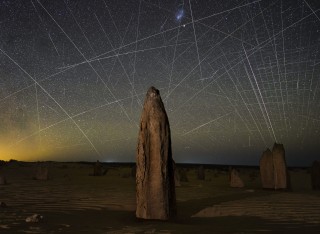
Astha
Academic and research departments
About
My research project
Low Surface Brightness FrontierWe aim at studying the faint stellar halos of galaxies as byproducts of hierarchical
assembly processes within the accepted cosmology. These extremely low surface brightness
edges of galaxies encode information about the very smallest mass, lowest density, and
stellar systems that can form, opening a new window on galaxy formation models and
cosmology. In order to achieve our goal we will obtain a clean map of resolved
main-sequence turnoff stars to obtain the ages, metallicities, and star formation
histories. We will hunt for past accretion events, including shells, streams, and
over-densities, similar to those reported at larger mass scales in the Milky Way and M31
but at an unprecedented low surface brightness.
Supervisors
We aim at studying the faint stellar halos of galaxies as byproducts of hierarchical
assembly processes within the accepted cosmology. These extremely low surface brightness
edges of galaxies encode information about the very smallest mass, lowest density, and
stellar systems that can form, opening a new window on galaxy formation models and
cosmology. In order to achieve our goal we will obtain a clean map of resolved
main-sequence turnoff stars to obtain the ages, metallicities, and star formation
histories. We will hunt for past accretion events, including shells, streams, and
over-densities, similar to those reported at larger mass scales in the Milky Way and M31
but at an unprecedented low surface brightness.
My qualifications
Taking advantage of generations of terrestrial and space-based instruments, the Master of Astronomy and Astrophysics trains students to study the origin, structure, and evolution of planets, stars, star systems, and the universe itself.
Relevant Modules: Binary Stars, Relativity, Star Formation, Galaxies and Cosmology, Observational
Techniques in Astronomy, Research Projects in Theoretical Astrophysics, Interstellar Matter, Stellar Structure and
Evolution, Stellar Atmospheres and Stellar Winds, Radiation Processes in Astronomy.
The focus of the programme was on theoretical and experimental skills in Physics and Mathematics.
•Summer school on Cosmology, Abdus Salam International Centre for Theoretical Physics (ICTP), July 2022
1. Learnt about the current state of research in Cosmology and Astroparticle physics
Relevant Topics Covered: Gravitational Waves, Statistical Methods in Cosmology, Structure Formation
•Summer School on Astronomy and Astrophysics, The Inter –University Centre for Astronomy and Astrophysics
(IUCAA), May 2021
1. Introduction to Astronomy and Astrophysics through lectures and practical sessions.
Relevant Topics Covered: General Relativity, Gravitational waves, Compact Objects, Machine Learning,
Solar physics, AGNs, Cosmology
•Founder of Astronomy and Astrophysics blogging site – Yugen25.blogspot.com (Yugen Theory)
1. Ranked 24th in top astrophysics blogs by Feedspot.com
•Citizen Science: (January 2018-Present)
1. Part of Disk Detective main Team, Zooniverse
2. Other Zooniverse Projects: GWITCHHUNTERS (264 Classifications), SuperWASP Variable Stars (147
Classifications, Citizen ASASSN (74 Classifications, Supernova Hunters (71
Classifications) and Planet Hunters Tess. (7 Classifications)
3. 1000+ Galaxy classifications in Galaxy Cruise Project by National Astronomical Observatory of Japan
•SPACEONOVA DDUC CHAPTER, Space Technology & Astronomy based Club, (May 2019- June 2020)
1. One of the founding and core members of society, Position: Treasurer and Event Organizer
Main Event- World Space Week- Responsibility: Finance, Group handling (10-20 people)
